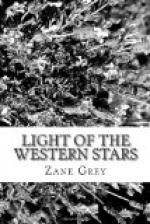Juarez, Mexico, July 31.—General Orozco, chief of the rebels, declared to-day:
“If the United States will throw down the barriers and let us have all the ammunition we can buy, I promise in sixty days to have peace restored in Mexico and a stable government in charge.”
Casas GRANDES, Chihuahua, July 31.—Rebel soldiers looted many homes of Mormons near here yesterday. All the Mormon families have fled to El Paso. Although General Salazar had two of his soldiers executed yesterday for robbing Mormons, he has not made any attempt to stop his men looting the unprotected homes of Americans.
Last night’s and to-day’s trains carried many Americans from Pearson, Madera, and other localities outside the Mormon settlements. Refugees from Mexico continued to pour into El Paso. About one hundred came last night, the majority of whom were men. Heretofore few men came.
Madeline read on in feverish absorption. It was not a real war, but a starving, robbing, burning, hopeless revolution. Five men executed for alleged offenses of a trivial nature! What chance had, then, a Federal prisoner, an enemy to be feared, an American cowboy in the clutches of those crazed rebels?
Madeline endured patiently, endured for long interminable hours while holding to her hope with indomitable will.
No message came. At sunset she went outdoors, suffering a torment of accumulating suspense. She faced the desert, hoping, praying for strength. The desert did not influence her as did the passionless, unchangeable stars that had soothed her spirit. It was red, mutable, shrouded in shadows, terrible like her mood. A dust-veiled sunset colored the vast, brooding, naked waste of rock and sand. The grim Chiricahua frowned black and sinister. The dim blue domes of the Guadalupes seemed to whisper, to beckon to her. Beyond them somewhere was Stewart, awaiting the end of a few brief hours—hours that to her were boundless, endless, insupportable.
Night fell. But now the white, pitiless stars failed her. Then she sought the seclusion and darkness of her room, there to lie with wide eyes, waiting, waiting. She had always been susceptible to the somber, mystic unrealities of the night, and now her mind slowly revolved round a vague and monstrous gloom. Nevertheless, she was acutely sensitive to outside impressions. She heard the measured tread of a guard, the rustle of wind stirring the window-curtain, the remote, mournful wail of a coyote. By and by the dead silence of the night insulated her with leaden oppression. There was silent darkness for so long that when the window casements showed gray she believed it was only fancy and that dawn would never come. She prayed for the sun not to rise, not to begin its short twelve-hour journey toward what might be a fatal setting for Stewart. But the dawn did lighten, swiftly she thought, remorselessly. Daylight had broken, and this was Thursday!




